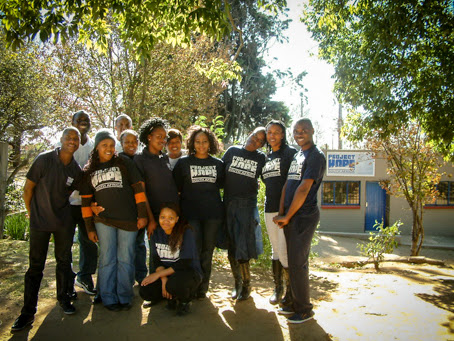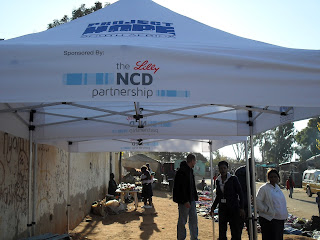When is it ok for chronic illness to be normal? This is something that I have been pondering for the last few days, but it first came up when I used to live in Mozambique. There are certain chronic illnesses which unfortunately result in people suffering pain and other disabilities with very little that can be done. However, there are other conditions where this does not have to be the case.
 When I lived in Mozambique, I stayed in a Malaria endemic area, and over the course of a couple of years suffered from multiple bouts of the disease. The first time I got it I remember the crippling headache, fever, lethargy like an extreme case of the flu. After I had taken my medication for about a week I felt much better and continued on with life as normal. Yet I clearly remember the subsequent bouts of malaria were often not as crippling - yes there was a fever and a headache, but because of work and other commitments I often couldn't take time off and I would soldier on through. Then it began to hit me. What if everyone was feeling like this? What if the many people who had malaria, had a constant headache, felt tired, but because of pressures to just survive, pushed on through without taking time off to go to a clinic and queue for a test and rest at home. Would this feeling over time become the new "normal" forgetting what it was like to live pre-malaria?
When I lived in Mozambique, I stayed in a Malaria endemic area, and over the course of a couple of years suffered from multiple bouts of the disease. The first time I got it I remember the crippling headache, fever, lethargy like an extreme case of the flu. After I had taken my medication for about a week I felt much better and continued on with life as normal. Yet I clearly remember the subsequent bouts of malaria were often not as crippling - yes there was a fever and a headache, but because of work and other commitments I often couldn't take time off and I would soldier on through. Then it began to hit me. What if everyone was feeling like this? What if the many people who had malaria, had a constant headache, felt tired, but because of pressures to just survive, pushed on through without taking time off to go to a clinic and queue for a test and rest at home. Would this feeling over time become the new "normal" forgetting what it was like to live pre-malaria? Fast forward almost 9 years and I am sitting in Zandspruit, South Africa wondering exactly the same thing. We are screening people of diabetes and hypertension. We've come across some patients with blood glucose of 37 mmol/l or 666mg/dl, another patient with 27 mmol/l or 486 mg/dl. Many patients had blood pressure of over 160/100 mmHg. In fact over 35% of patients have had an abnormally high blood sugar reading. One of my first questions I ask these patients is, "How are you feeling?" Often the response is tired, headache, blurry vision, sweating a lot, having to use the bathroom frequently. My next question is "Are you aware that you have high blood or high blood sugar?" Some patients say yes, whilst others say no.
Fast forward almost 9 years and I am sitting in Zandspruit, South Africa wondering exactly the same thing. We are screening people of diabetes and hypertension. We've come across some patients with blood glucose of 37 mmol/l or 666mg/dl, another patient with 27 mmol/l or 486 mg/dl. Many patients had blood pressure of over 160/100 mmHg. In fact over 35% of patients have had an abnormally high blood sugar reading. One of my first questions I ask these patients is, "How are you feeling?" Often the response is tired, headache, blurry vision, sweating a lot, having to use the bathroom frequently. My next question is "Are you aware that you have high blood or high blood sugar?" Some patients say yes, whilst others say no. This one patient situation typifies most. He had a very high blood sugar and blood pressure level. He knows that he is diabetic and has high blood pressure. He used to take the tablets, but he doesn't anymore because he didn't think they worked, they ran out, and he couldn't take time off work to go to the clinic and queue all day to get another prescription.
This one patient situation typifies most. He had a very high blood sugar and blood pressure level. He knows that he is diabetic and has high blood pressure. He used to take the tablets, but he doesn't anymore because he didn't think they worked, they ran out, and he couldn't take time off work to go to the clinic and queue all day to get another prescription.
So, when is ok for chronic illness to be normal? Have patients simply forgotten what it was like to "feel" energetic and headache free? Do people soldier on feeling like this because in their minds there is no other option, or is it because they don't know any better?
The answer is NEVER. It should not be acceptable. You and I would most likely do everything we possibly could to feel better again. But we are the lucky few, where barriers to quality healthcare are few and far between.
I suspect for the patients that I met in Zandspruit, the reason that chronic illness has become 'normal' is a combination of living on the bread line trying to make end's meat, and the absurd inefficiencies, lack of care, education and other barriers that they face at government clinics that leads to a sense of hopelessness and acceptance of feeling ill.
My hope is that as we slowly break down the barriers in the community, reducing wait times at clinics, improving patient self care, reducing blood pressure and blood sugars to a manageable point, these patients will feel so much better, more productive, able to do things they haven't been able to do for years, that they will advocate for improved quality, improved access to preventative screenings like the ones we are doing.
Over the coming weeks Project HOPE in partnership with Eli Lilly, The University of Pretoria, Empilweni Nursing College, and other community stakeholders will continue to hold screening days to make people aware of these conditions, and then will be able to refer them to our HOPE Centre clinic where they will receive proper care and attention and hopefully very quickly begin to see drastic improvements in their health.



















